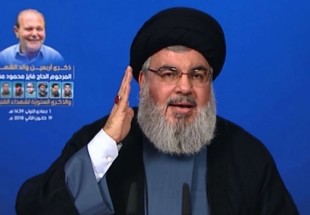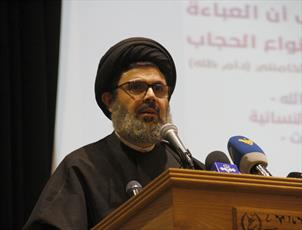Hawzah News Agency (Beirut, Lebanon) - Hezbollah criticized the Lebanese government on Friday for allowing cinemas to screen Stephen Spielberg's film "The Post" despite calls for a ban because of the director's links to Israel. The movie premiered in Beirut this week after Lebanon's interior minister ruled against any ban.
Activists in Lebanon had campaigned against the film because Spielberg gave funds to Israel during its 2006 war with Hezbollah in Lebanon. The two countries are officially enemy states.
"We reject this decision. We consider it a mistake," said Sayyed Hassan Nasrallah, leader of the political and military movement.
"This man announced his support for the Israeli aggression against Lebanon," he said in an address. "He paid Israel from his own money...to kill your children and destroy your houses."
A month-long conflict in 2006 killed about 1,200 people in Lebanon, mostly civilians, and 160 Israelis, most of them troops. There has been no major confrontation between the two sides since.
The Post dramatises the 1971 battle by American newspapers to publish leaked documents, known as the Pentagon Papers, about the US government's role in the Vietnam War.
Lebanon - widely seen as a relative bastion of free speech in the Arab world - banned the film Wonder Woman last year over the starring role of the Israeli actress Gal Gadot.
However, with The Post, the interior ministry chose not to sign off on the ban decision by General Security, which in addition to controlling Lebanon's borders, is responsible for censoring films, plays and books.
In a statement, it said Interior Minister Nohad Mashnouk "sees no objection to the broadcast of the film," which "has no connection with Lebanon, or to the conflict with the Israeli enemy".
The distribution company in Lebanon confirmed that the film, starring Meryl Streep and Tom Hanks, would be released in cinemas in Beirut and elsewhere.
The initial ban against the movie faced a backlash, with critics slamming it as unjustified censorship.
Free speech advocate Gino Raidy hailed the latest decision as a triumph for reason.
"The overreaching hand of censorship has gone too far, too many times," he wrote on his blog.
French-Lebanese director Ziad Doueiri was held for questioning by Lebanese authorities in September over his film "The Attack", which was partially shot in Israel.
Banned films can often be found in bootleg movie shops across the country for as little as one dollar, and even blacklisted books can sometimes be found in regular bookstores.



Your Comment